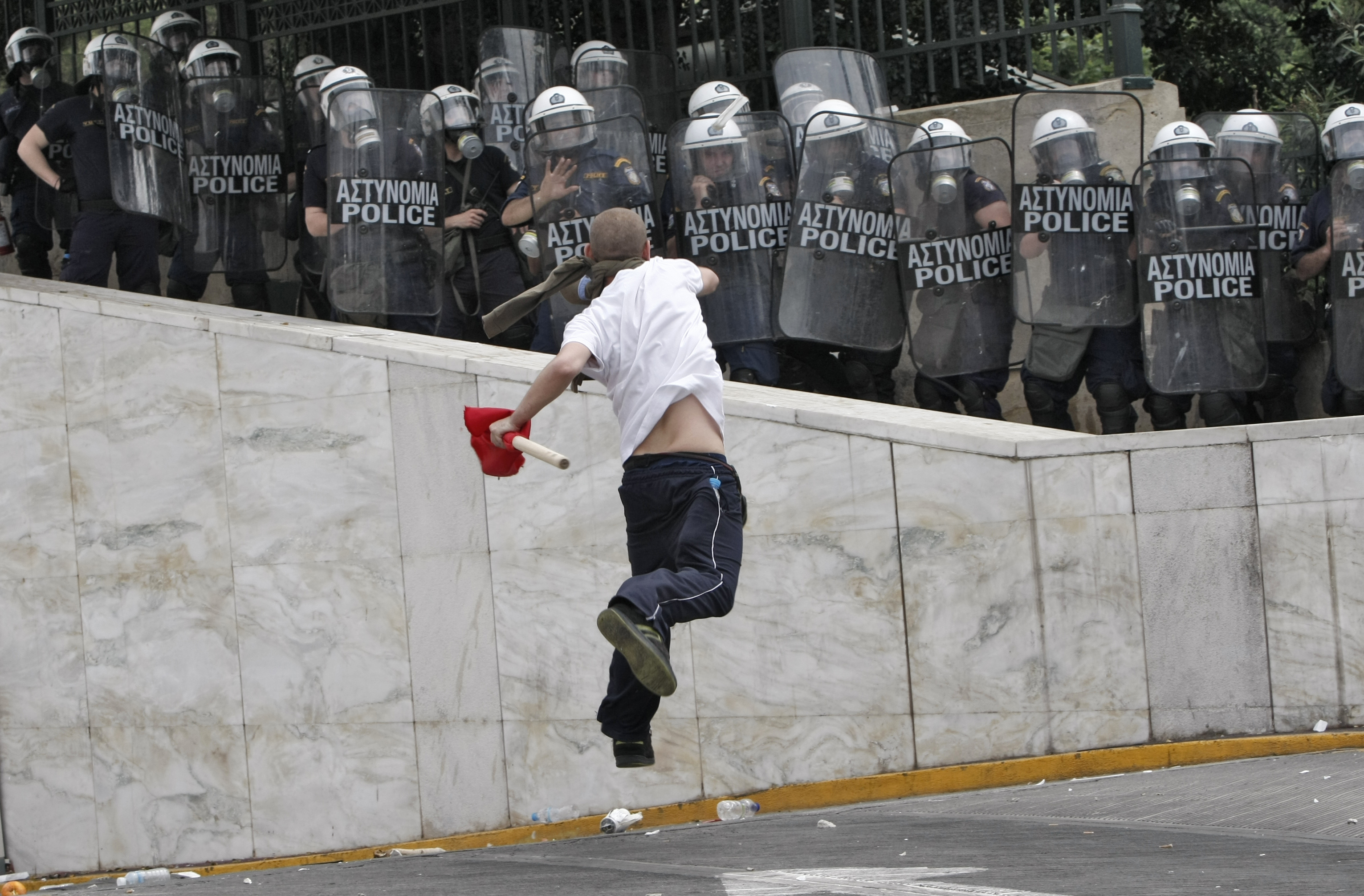Markets have “pushed Greece down the stairs”

Greece has come under attack from financial markets and has been “pushed down the stairs”, Swiss economist Paul Dembinski tells swissinfo.ch.
Greece’s economic crisis is sending shivers through global markets as investors and policymakers fear it could spread like wildfire through Europe and beyond. The country is facing up to three years’ recession as it tries to cut its deficit.
The Greek government told parliament on Thursday there was no alternative to the deep budget cuts in its austerity plan.
On Wednesday some 50,000 Greeks marched in Athens in protest at the planned measures and a petrol bomb attack killed three workers in a bank.
swissinfo.ch: What are the causes of Greece’s high levels of debt?
Paul Dembinski: They are the same as those behind the heavy debts of pretty much most governments, apart from the Swiss.
Over the past 20 years, the general approach has been not to increase taxes, or to be very cautious in this respect, and to have lots of difficulties controlling expenditure, especially of a social nature.
I suspect that a large part of Greece’s debt was used to finance social services, as many people are lost, need help and are excluded from the labour market.
In other words, and I think this is very important, their debt was not just caused by bad management; it also reflects social tensions that have been alleviated via expenditure.
swissinfo.ch: Are fears justified that the Greek crisis may spread to other countries such as Portugal or Spain?
P.D.: Financial markets are always looking for a victim. They are seeking to generate volatility on which they can earn their daily bread. Essentially, they look for weaknesses. They try to find movements on which some surf and others plunge.
Greece has come under attack. I’m not sure there were any deeper factors behind all that. Now having pretty much succeeded with Greece, the emphasis is on Portugal and Spain. But I don’t see the emergency.
Greece, Portugal and Spain are all members of the eurozone. Europe’s survival is under scrutiny and it cannot be seen to fail over a small country. If it had been Germany, there might have been problems over the amount of the bailout, but not with Greece, Portugal or even Spain. That’s not the point.
The issue here is about the extremely profitable instruments of market makers, which bet on certain countries crashing, while trying to push them down the stairs.
swissinfo.ch: So, Spain or Portugal will not fall unless they are pushed?
P.D.: Given the huge global debt (external and internal) mountain of the eurozone and of the United States – which has one of the biggest debts – we are searching for solutions. There are three possible solutions in a stable world.
First, inflation, which dissolves debt; this is a very good way of relieving the debt burden. Then, there is the solution which Argentina is going through – a restructuring, whereby the worst part of the debt is defaulted. The third is economic recession.
The debt mountain is impressive, but it is not worse for Greece or Spain than for all other OECD [Organisation for Economic Co-operation and Development] countries. But how do we get out of this situation? This question worries me.
swissinfo.ch: But is there an alternative to debt?
P.D.: Inflation. For the past 15 years, we have been stuck in a strict monetary straightjacket mostly in the interest of investors in order to preserve the value of currencies that are lent. But historically we have often functioned by reducing a share of debt through low inflation.
Let’s not forget that the bailout package for Greece is not strictly intended to help Greece but to reassure investors about the country’s ability to pay its debts. The main concern is not whether Greece is undergoing any restructuring, but if it has any liquid assets.
swissinfo.ch: What are your thoughts on the Greek rescue package?
P.D.: I am quite worried about the way it is being sold to the public, especially in France and Germany. French, German and other taxpayers are told it’s a good deal, as money is borrowed at a lower price than it is lent to the Greeks. If that’s solidarity within Europe then…
When someone is in a mess, we should extend a helping hand rather than say we are doing good business thanks to them. This is perhaps necessary for the general public – I can’t really say – but it’s quite worrying.
But I don’t really know what else Europe could have done other than send in the ambulance. We could have asked Greece to default on half of its debt. The remainder would then have been assumed by investors but would have caused panic on the markets. The investors took a risk as they could have lost half – that’s the game. The question is whether we have taken into account what is good for the patient or what is good for the doctor.
swissinfo.ch: Will the demonstrators manage to make their voices heard?
P.D.: I don’t know Greece well enough, but if you take the example of Spain, which has 20 per cent unemployment, or five million people affected of whom 1.5 million where entire families are unemployed, there are clearly mounting tensions. This is what’s happening in Europe, but also in the US.
Therefore I don’t think investors that have lent to states will be paid back in the medium term. It’s clear that debts will have to be restructured.
Pierre-François Besson, swissinfo.ch (Translated from French by Simon Bradley)
The Greek government owes about €300billion (SFr426.8 billion) and has to pay off part of it this month.
This should now be met – the European Union and International Monetary Fund (IMF) announced a bail-out package on May 2 – the biggest in recent history.
They are offering €110billion spread over three years – but on condition that Greece slashes public spending and boosts tax revenue.
Ratings agency S&P has already downgraded Greek debt to “junk”, which means it views Greece as a highly risky place to invest.
There are fears that the Greek problem could spread to other eurozone countries, which are now anxious to bolster investor confidence.
Germany has agreed to pay €8.4 billion, followed by France (€6.3 billion), Italy (€5.5 billion), Spain (€3.7 billion), the Netherlands (€1.8 billion) and Belgium (€1.1 billion).
Switzerland has yet to define its position concerning the Greek crisis but it could in theory pay SFr690 million as part of its International Monetary Fund (IMF) contribution.
The money would come from the Swiss National Bank’s currency reserves which are in an IMF pool. Switzerland contributes 1.6 per cent of this pool.
Public sector pay frozen till 2014
Public sector salary bonuses – equivalent to two months’ extra pay – scrapped or capped
Public sector allowances cut by 20%
State pensions frozen or cut; contribution period up from 37 to 40 years
Average retirement age up from 61 to 63; early retirement restricted
VAT increased from 19% to 23%
Taxes on fuel, alcohol and tobacco up 10%
One-off tax on profits, plus new gambling, property and green taxes
Paul Dembinski is a professor of economic and social sciences at Fribourg University. He also teaches at the Federal Institute of Technology in Lausanne and is the director of the Observatoire de la Finance in Geneva.
He is founder and editor of the bilingual journal “Finance & the Common Good/Bien Commun”. He has written many books and scientific articles in the field of internationalisation of enterprises, competition, ethics and finance.

In compliance with the JTI standards
More: SWI swissinfo.ch certified by the Journalism Trust Initiative












You can find an overview of ongoing debates with our journalists here . Please join us!
If you want to start a conversation about a topic raised in this article or want to report factual errors, email us at english@swissinfo.ch.